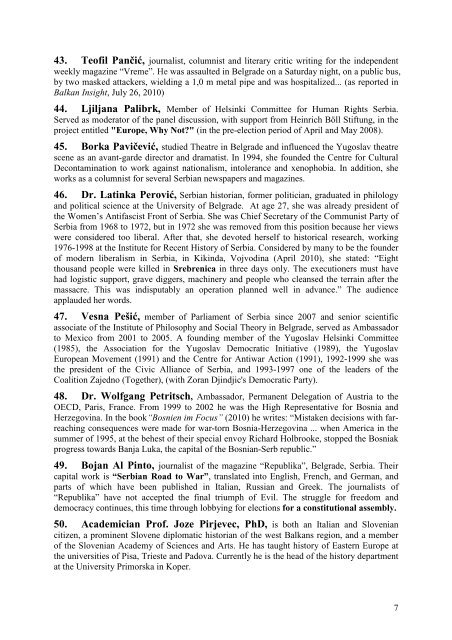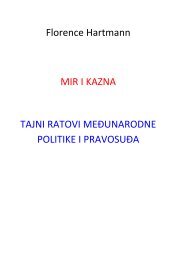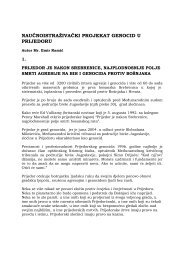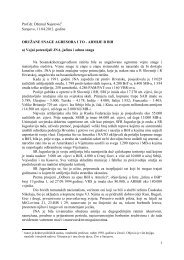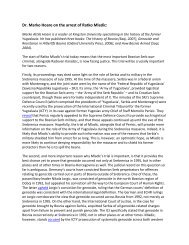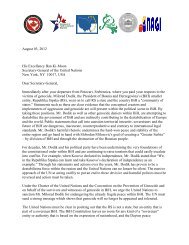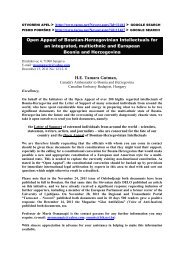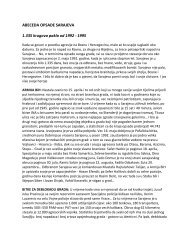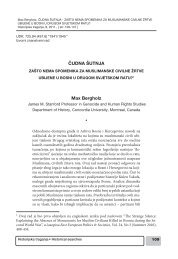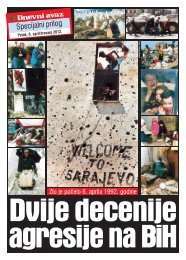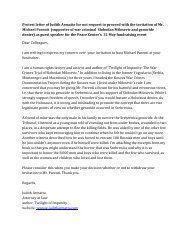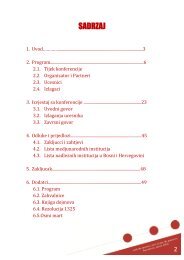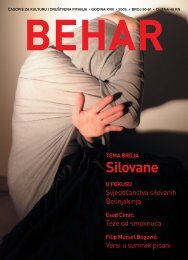Letter of Support from Intellectuals around the world - Institute For ...
Letter of Support from Intellectuals around the world - Institute For ...
Letter of Support from Intellectuals around the world - Institute For ...
You also want an ePaper? Increase the reach of your titles
YUMPU automatically turns print PDFs into web optimized ePapers that Google loves.
43. Te<strong>of</strong>il Pančić, journalist, columnist and literary critic writing for <strong>the</strong> independent<br />
weekly magazine “Vreme”. He was assaulted in Belgrade on a Saturday night, on a public bus,<br />
by two masked attackers, wielding a 1,0 m metal pipe and was hospitalized... (as reported in<br />
Balkan Insight, July 26, 2010)<br />
44. Ljiljana Palibrk, Member <strong>of</strong> Helsinki Committee for Human Rights Serbia.<br />
Served as moderator <strong>of</strong> <strong>the</strong> panel discussion, with support <strong>from</strong> Heinrich Böll Stiftung, in <strong>the</strong><br />
project entitled "Europe, Why Not?" (in <strong>the</strong> pre-election period <strong>of</strong> April and May 2008).<br />
45. Borka Pavičević, studied Theatre in Belgrade and influenced <strong>the</strong> Yugoslav <strong>the</strong>atre<br />
scene as an avant-garde director and dramatist. In 1994, she founded <strong>the</strong> Centre for Cultural<br />
Decontamination to work against nationalism, intolerance and xenophobia. In addition, she<br />
works as a columnist for several Serbian newspapers and magazines.<br />
46. Dr. Latinka Perović, Serbian historian, former politician, graduated in philology<br />
and political science at <strong>the</strong> University <strong>of</strong> Belgrade. At age 27, she was already president <strong>of</strong><br />
<strong>the</strong> Women’s Antifascist Front <strong>of</strong> Serbia. She was Chief Secretary <strong>of</strong> <strong>the</strong> Communist Party <strong>of</strong><br />
Serbia <strong>from</strong> 1968 to 1972, but in 1972 she was removed <strong>from</strong> this position because her views<br />
were considered too liberal. After that, she devoted herself to historical research, working<br />
1976-1998 at <strong>the</strong> <strong>Institute</strong> for Recent History <strong>of</strong> Serbia. Considered by many to be <strong>the</strong> founder<br />
<strong>of</strong> modern liberalism in Serbia, in Kikinda, Vojvodina (April 2010), she stated: “Eight<br />
thousand people were killed in Srebrenica in three days only. The executioners must have<br />
had logistic support, grave diggers, machinery and people who cleansed <strong>the</strong> terrain after <strong>the</strong><br />
massacre. This was indisputably an operation planned well in advance.” The audience<br />
applauded her words.<br />
47. Vesna Pešić, member <strong>of</strong> Parliament <strong>of</strong> Serbia since 2007 and senior scientific<br />
associate <strong>of</strong> <strong>the</strong> <strong>Institute</strong> <strong>of</strong> Philosophy and Social Theory in Belgrade, served as Ambassador<br />
to Mexico <strong>from</strong> 2001 to 2005. A founding member <strong>of</strong> <strong>the</strong> Yugoslav Helsinki Committee<br />
(1985), <strong>the</strong> Association for <strong>the</strong> Yugoslav Democratic Initiative (1989), <strong>the</strong> Yugoslav<br />
European Movement (1991) and <strong>the</strong> Centre for Antiwar Action (1991), 1992-1999 she was<br />
<strong>the</strong> president <strong>of</strong> <strong>the</strong> Civic Alliance <strong>of</strong> Serbia, and 1993-1997 one <strong>of</strong> <strong>the</strong> leaders <strong>of</strong> <strong>the</strong><br />
Coalition Zajedno (Toge<strong>the</strong>r), (with Zoran Djindjic's Democratic Party).<br />
48. Dr. Wolfgang Petritsch, Ambassador, Permanent Delegation <strong>of</strong> Austria to <strong>the</strong><br />
OECD, Paris, France. From 1999 to 2002 he was <strong>the</strong> High Representative for Bosnia and<br />
Herzegovina. In <strong>the</strong> book“Bosnien im Focus” (2010) he writes: “Mistaken decisions with farreaching<br />
consequences were made for war-torn Bosnia-Herzegovina ... when America in <strong>the</strong><br />
summer <strong>of</strong> 1995, at <strong>the</strong> behest <strong>of</strong> <strong>the</strong>ir special envoy Richard Holbrooke, stopped <strong>the</strong> Bosniak<br />
progress towards Banja Luka, <strong>the</strong> capital <strong>of</strong> <strong>the</strong> Bosnian-Serb republic.”<br />
49. Bojan Al Pinto, journalist <strong>of</strong> <strong>the</strong> magazine “Republika”, Belgrade, Serbia. Their<br />
capital work is “Serbian Road to War”, translated into English, French, and German, and<br />
parts <strong>of</strong> which have been published in Italian, Russian and Greek. The journalists <strong>of</strong><br />
“Republika” have not accepted <strong>the</strong> final triumph <strong>of</strong> Evil. The struggle for freedom and<br />
democracy continues, this time through lobbying for elections for a constitutional assembly.<br />
50. Academician Pr<strong>of</strong>. Joze Pirjevec, PhD, is both an Italian and Slovenian<br />
citizen, a prominent Slovene diplomatic historian <strong>of</strong> <strong>the</strong> west Balkans region, and a member<br />
<strong>of</strong> <strong>the</strong> Slovenian Academy <strong>of</strong> Sciences and Arts. He has taught history <strong>of</strong> Eastern Europe at<br />
<strong>the</strong> universities <strong>of</strong> Pisa, Trieste and Padova. Currently he is <strong>the</strong> head <strong>of</strong> <strong>the</strong> history department<br />
at <strong>the</strong> University Primorska in Koper.<br />
7


